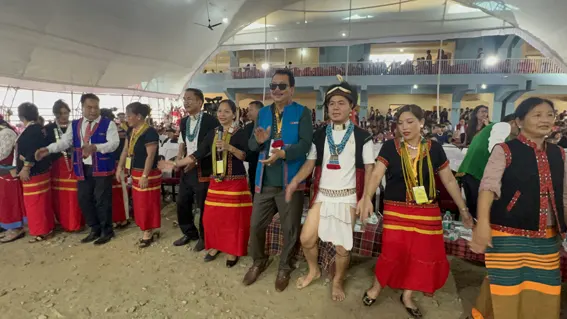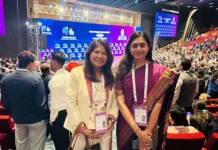Festivals carriers of cultural heritage: DCM
ITANAGAR, 1 Sep: “Festivals are fond ways of celebrating the glorious heritage, culture and traditions, and are the carriers of rich traditions and cultural contexts to new generations,” said Deputy Chief Minister Chowna Mein, attending the Solung festival celebration here on Thursday.
He said that “a silent revolution among the youths can be seen across the state for the need to preserve, promote and propagate the rich culture, tradition and heritage,” and urged the elders and intellectuals of the Adi community to “take the opportunity to pass on the legacy to younger generations about the annals of their own community, language, cultural ethos and traditional values.”
The DCM said he is “optimistic that the celebration of Solung festival will strengthen the preservation, promotion and rejuvenation of the age-old customs and traditions of the Adi tribe.”
He said that the state government has taken several initiatives to preserve and promote the state’s culture, “such as registration of 3,000 priests and increase in the allocation for honorariums to registered indigenous priests.”
He announced that “applications for geographical indicator (GI) registration for five products, including Khamti rice, yak churpi and Adi kekir ginger, have already been filed with the registry.”
“We have also filed a record number of nine applications for GI registration, including handlooms and handicrafts in this year of Azadi Ka Amrit Mahotsav, namely, Monpa handmade paper, Wancho woodcraft and beads-craft, Nyishi handloom textiles, handwoven woollen carpets, Apatani textiles, and Tangsa handloom,” he said.
The DCM also spoke about the research being carried out by the history department of Rajiv Gandhi University on the unsung heroes of Arunachal Pradesh.
“Rajiv Gandhi University has identified 15 unsung heroes, 100 freedom fighters and 64 martyrs from various communities, which have been recognised by the government of India. The names of the unsung heroes have been uploaded to their portal too,” he said.
He also informed that the state government, in collaboration with the National School of Drama, “will produce three theatre productions on Khamti rebellion of 1839 and Anglo-Abor wars of 1911-12, and Ninu massacre.”
“Construction of a war memorial and a museum is also in the pipeline,” he added.
Expressing concern over drug addiction among the youths, he urged all to “wage a war against drugs to save the future generation,” and lauded the efforts of women SHGs working for eradication of drugs from the society.
The DCM also spoke about “the vast tourism potential of the state” and gave assurance that “the state government will leave no stone unturned in its efforts to boost tourism in the state.”
He also urged the leaders of various student unions to “prepare a combined roadmap and shoulder responsibility to take up social issues and actively participate for the cause and development of the society for a progressive state.”
In Upper Siang district, Solung festival was celebrated with traditional fervour and gaiety at the Solung ground in headquarters Yingkiong.
Sports Minister Mama Natung, who along with Upper Siang DC Shashvat Saurabh attended the festivity, extended greetings to the Adi community on the occasion, and said that “Arunachal is a living example of unity in diversity with multiple tribes having beautiful cultural traditions and beliefs in the entire Northeast.”
He urged the people to preserve and promote their rich cultural heritage and traditions.
Earlier, local MLA and Health Minister Alo Libang spoke on the “historical aspects and importance of Solung festival in Adi tribe.”
Cultural presentations and Ponung dance by various troupes were the highlights of the event.
The festival was also celebrated in Tuting, where Adi Bane Kebang (ABK) president Tadum Libang and ABK secretary-general Okom Yosung attended the celebration.
Our correspondent reports: The Adi people of East Siang, Siang, Upper Siang and Dibang Valley districts on Thursday celebrated Solung festival with traditional fervour for a bumper harvest and wellbeing of domesticated beasts.
People from all walks of life gathered at the respective community halls and festival grounds, wearing traditional attires, and celebrated the festival with great enthusiasm.
The celebration has started in different villages under Pasighat, Ruksin, and Mebo subdivisions of East Siang district.
The inaugural day of the three-day festivities featured hoisting of the Solung flag by invited guests, congregational prayer to Kiine-Naane (Laxmi Devi), discussion on the Solung mythology, and community feasts.
Attending the celebration in Oyan village in East Siang, Ruksin ZPM Aruni Jamoh urged the villagers to “keep their tradition to preserve ethnic identity.”
Stating that “festivals are the right platform to unite community people,” the ZPM said that “such celebration brings unity and a sense of brotherhood among all.”
Oyan GB Basonsing Pao in his address said that “people of different castes and communities in their villages celebrate all tribal festivals, thereby maintaining cordial relations.”
Health Services Director Dr Dimong Padung attended the celebration in Ngorlung village, and urged the villagers to “preserve their ancestral culture with living traditions through the festivities.”
He said that “Solung is not only a festival of entertainment but also an event to worship the goddess for survival of the community people and domesticated beasts.”
In Mikong village in East Siang, Ruksin ICDS CDPO Onyok Panyang attended the festival and urged the villagers to “preserve and promote their traditional culture while preserving the ethos or myth of the festivities.”
The festival organisers have invited a mirii (priest) who will lead the three-night ‘Solung-Aabang’, a ritual focusing on the evolution and civilisation of the Adi people through priest songs. (With inputs from DCM’s PR Cell & DIPRO)


